As the 3rd character to join the Ranger class, Riptide was always going to face an uphill battle for a fandom. The competitive player is likely to gravitate toward Lexi, who currently leads the meta as the deck to beat; and the heart of the Ranger class lies with Azalea, whose struggles to legitimize the bow-and-arrow tactics of FAB have consumed a segment of the player base since Arcane Rising. A third Ranger was going to have to rely on an appealing theme and unique mechanics to gain traction.
What we received was a greasy, sloppy, perhaps undead fisherman whose game mechanics encourage use of the biggest design failure of Flesh and Blood: traps.

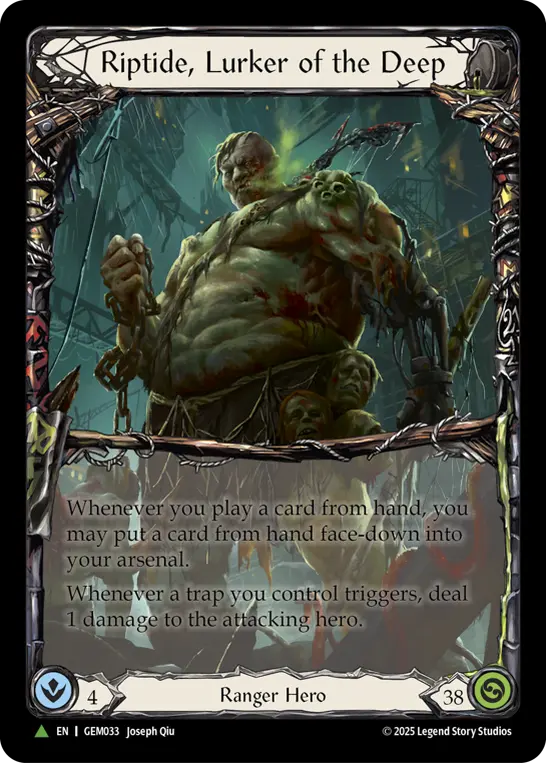
Riptide was dead on arrival.
Which isn't to say he was a failure. Certainly he was competent. He could win games at Armories. And people did play him, do play him. But no one really talks about him. You hear people debating the prospects of Uzuri, or puzzling over how to make 'new Prism' work, or insisting that Emperor is legit. But no one's charting the rise or fall of Riptide's star. He managed to slip into that worst-of-all-worlds gap where he's sorta bad, but not so bad that you really want to make him good. He's just sorta there.
What's remarkable is, Riptide's actually managed to score some Living Legend points somewhere in all this! With 2 points in Classic Constructed, Riptide can currently boast a better record than either of the new Dusk Till Dawn heroes. In Blitz, he's actually managed to claim 16 points, placing him ahead of cult favorites like Kayo, Benji, Valda, Emperor, Data Doll, Shiyana, and Kavdaen.
If you didn't know this, join the club - and it illustrates the point that Riptide is simply not attracting interest. Which is a shame, because the further I dive in, the more I see a truly flexible deck lurking just beneath the surface.
Trapping for Fun and Profit
Any discussion of Riptide has to begin at traps, the card type that sets him apart from his fellow Rangers. Whenever his traps trigger - meaning the secondary text of the card comes into effect, usually based on some condition of the attack it's defending against - Riptide deals 1 damage to the attacker. For those who have lost games to Reckless Swing or Steelblade Shunt, you should see the potential there.
Traps can be separated into 4 categories:
Tax Traps
Modifier Traps
Go Again Traps
Reaction Traps



The tax traps have the widest application, as they each 'trigger' simply by being played, and Riptide will deal his 1 damage even if they pay to cancel the trap's effect. They're also the most restricted, as they must be played from arsenal - a zone that many cards compete for in a Ranger deck. Of these, Pitfall Trap is the most attractive, capable of dealing 3 damage on the defensive. Rockslide Trap has applications in matchups where modifiers matter, such as when facing Boltyn.

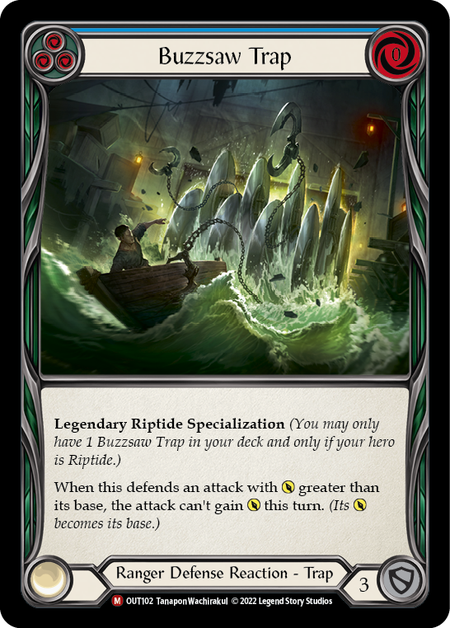
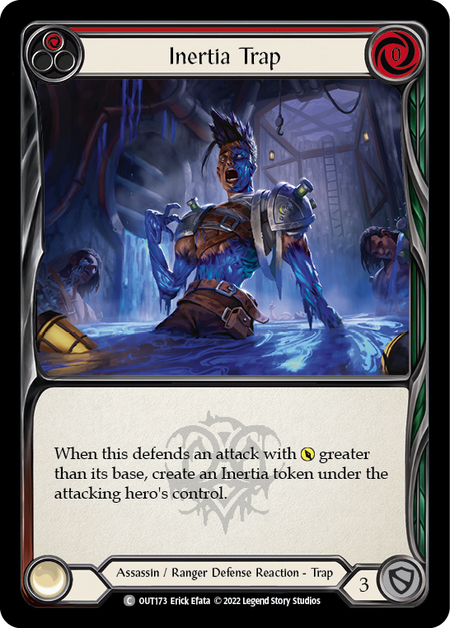
The standout modifier trap is, unsurprisingly, the one-per-deck Buzzsaw Trap, which strips away any modifiers and prevents future ones from impacting the attack. Boulder Trap can rob an opponent of stored blocking potential. And Inertia Trap can rob them of building an arsenal at the end of their turn. Modifier traps are well positioned versus heroes like Boltyn, Azalea, Dorinthea, Briar, Kassai, Ira, Rhinar, Kayo, and Lexi.
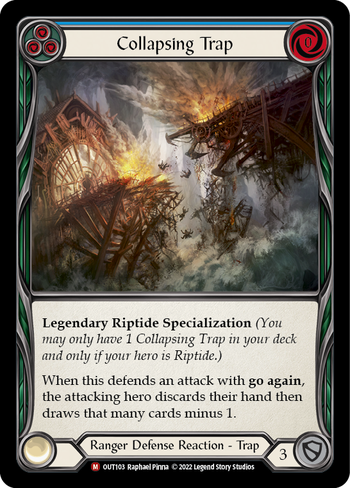
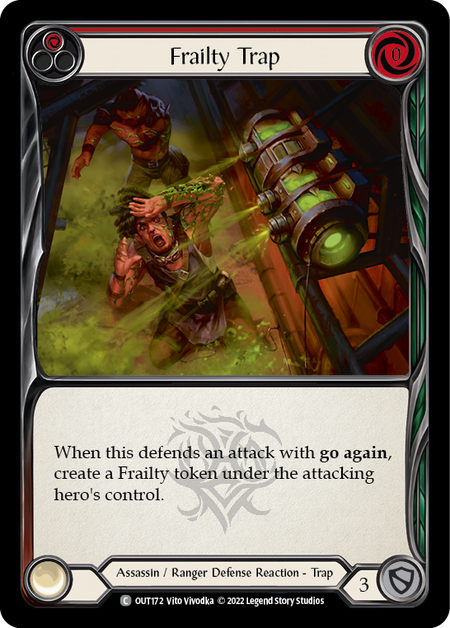

Go again traps cause absolute havoc into go-wide strategies. Collapsing Trap disrupts a carefully curated hand and cuts short its card count; but Frailty Trap is just as potent for limiting offensive capabilities, dropping a Frailty token during the opponent's turn for a surprise -1 to their weapons and arsenal. Go again traps should be considered when facing opponents like Fai, Dorinthea, Lexi, Katsu, Boltyn, Briar, Maxx, Chane, and Dash.


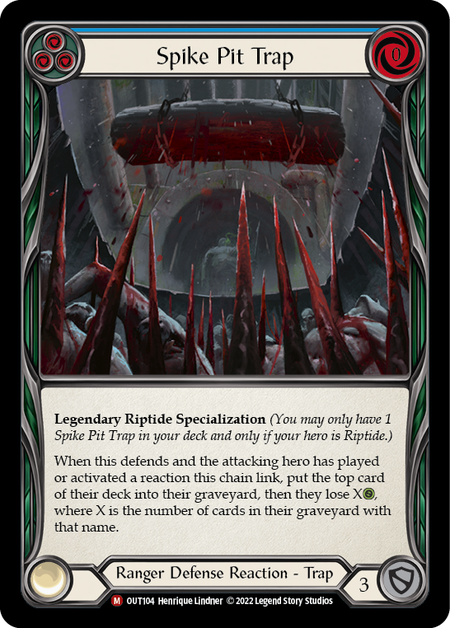
Reaction traps deal damage to the deck or the life total; but because they trigger on such specific card types, they have only narrow application. Spike Pit Trap has major potential when facing a deck that uses full cycles of key cards; and Bloodrot Pox tokens always put in work. Reaction traps have application against heroes like Dorinthea, Uzuri, Arakni, Kassai, and when you know your opponent is heavy into Pummel.


Riptide's defense reaction game is unparalleled, but he can't afford to simply sit on his traps waiting for the best opportunity to play them. His arsenal is incredibly important to all aspects of his gameplay. Traps are best played out of hand (to load his arsenal with something else); failing that, your trap becomes your pitch card, especially early in the game where pitched cards are likely to come back again in the endgame. If you do find yourself with a trap in hand at the end of your turn, it's fine to arsenal it, but you'll absolutely want to use it at your next opportunity, or cycle it away with Trench of Sunken Treasure or Driftwood Quiver.
Stocking The Tacklebox



The arsenal has a premiere role in Ranger gameplay, but Riptide uses it in a much more dynamic fashion. Whenever Riptide plays a card, he can slide a card from his hand facedown into his arsenal. Obviously, this is essential to utilize arrows. This also lets him easily gain the benefits of 'when played from arsenal' cards like Smashing Good Time, Promise of Plenty, and Plunder Run (in Blitz).



Virulent Touch can close games in a similar fashion to those unavoidable pings from traps; working in concern, Riptide can become inevitable in the endgame. And Riptide is just as well suited to Death Touch - an absolute power card with exceptional versatility - as Uzuri is.
But not every token is detrimental - at first glance, anyway. DMArmada's Bright Lights spoiler sent me over the conspiratorial edge with its effect, and instantly Coax a Commotion slid into my decklist. Giving an opponent's next attack a modifier and go again sets up 2 of your trap types to trigger! It's an incredibly


Because so many cards are competing for arsenal space (a reality that needs to be considered when deck building, lest you find yourself over-committed to the restricted space), Riptide is predisposed toward New Horizon. When used in tandem with Death Dealer, you can open a turn by pitching a resource card (ideally blue or yellow, to cover your costs for the turn) to load the bow with a face-up arrow from hand; then play out a buff or a soft go again attack, loading your 2nd arsenal slot with something that needs it.

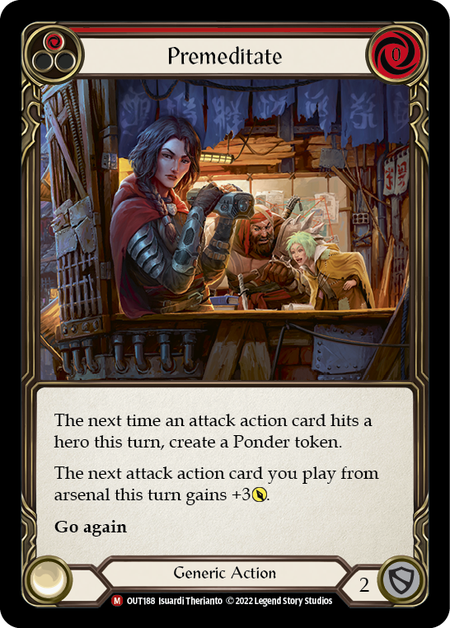
The damage on these turns can easily add up, even from 2-card hands. Consider a Premeditate from hand, slipping a Virulent Touch into arsenal, for 7 with a Ponder on hit and Bloodrot Poxes for any blocks. With 3 cards, those sorts of effects can get spread across multiple attacks for an unpredictable and hard-to-avoid assault: pitch yellow to Death Dealer, load Bolt'n' Shot, draw, play Premeditate from hand, load Death Touch, fire Bolt'n' Shot for 7 with a Ponder on hit, throw Death Touch for 6 with a disease on hit, arsenal the Ponder draw.
Managing this constant churn through the arsenal becomes a specialized skill when playing Riptide, as does finding the right moment for disruption. A well-timed disease or trap can dismantle an enemy's plan. I love to pick on Boltyn here, Riptide's perfect target, whose Lumina Ascension turn can simply fold to a Buzzsaw Trap or even a Frailty token.
A Sleeper Just Beneath the Surface
Why am I cycling back to the same Riptide talking points?
Because there's a new light shining on the game in the twilight of Tales of Aria. Much has been made of the Elemental heroes' peak performance, including from game designers themselves. In their shadows, many heroes haven't gotten the chance to shine. And while Riptide's shine may be more of a slick gloss, he's nonetheless ready for the spotlight.
When Lexi inevitably hits Living Legend in the culmination of the competitive season, Riptide will stand as an alternative to Azalea, - and when you compare those two Rangers, you find they're completely different.
The post-ELE meta is likely to see Boltyn, Uzuri, Levia, Bravo, Dromai, Fai, Azalea, and Viserai rising to the top - plus whichever Mechanologists take off. Of those, Boltyn, Fai, Uzuri, Dash, and Azalea are good matchups for Riptide, and I think he's got decent odds versus Bravo and Viserai too. (I won't stick my neck out and say Riptide can handle Dromai without more experience to back that up, but I have reason for hope.)
But more than that, the meta after Briar and Lexi is going to be more forgiving, encouraging players to try new things and allowing them the breathing room to develop skills with them.
I'm a player who like disruption and in-game flexibility. Making decisions like that mid-game absolutely enthralls me. In giving Riptide another look, I found those things in his gameplay. In the era of Elementals they were drowned out by oppressive efficiency; but now Outsiders is finding its voice and, very soon, a footing in the meta.




